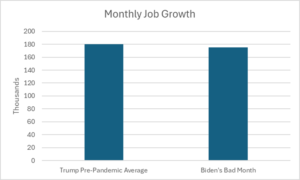May 20, 2024
The Washington Post has felt the need to continually emphasize the negative aspects of the economy under Biden. Remember all those great pieces on the fastest real wage growth in a half-century for the bottom quintile of workers, record rates of self-reported job satisfaction, the jump of 17 million people working from home, the 14 million homeowners saving thousands a year from having refinanced their mortgages 2020-22? And of course, they also remind readers regularly that the burst of inflation in the last three years was caused by the pandemic and happened in every wealthy country.
Yeah, that has not been the direction of economic coverage in the Post since President Biden took office. Instead, we get a focus on every piece of negative news and even efforts to turn positive news into negative news.
The latest was a front-page story that told us consumers were getting more negative on the economy. Among other items listed as bad news, the Post told us, “employers are adding fewer jobs.”
This comment presumably refers to the April jobs report which showed the economy added 175,000 jobs in the month. This is more than a bit bizarre to be included in the bad news category. There was widespread worry among economists that job growth had been faster than a rate that was sustainable without generating inflation, given the rate of growth of our labor market. The slowing to 175,000, a rate many still view as faster than sustainable, was viewed as great news by most economists.
While the Post apparently wants its readers to think this is a slow pace, it is almost exactly the average under Trump in the period before the pandemic.

Source: Bureau of Labor Statistics and author’s calculation.
As can be seen, Biden’s “bad” month would be just about Trump’s average month. And we know the Post always tells us the economy was great under Trump.
There are other items that are beyond silly in this piece. It tells us some stores are seeing fewer customers, something that is pretty much true always. This also is good news because stores had inflated their profit margins during the pandemic. The only way to get them to reduce them is if they feel that higher prices are costing them customers.
The best part is that the Post found a woman who lost her job in the pandemic and is now working for lower pay:
“In Pittsburgh, Jenny Shimkus is thinking twice about every purchase these days. She has stopped eating out and frequently drives to other neighborhoods for cheaper gas. When her vacuum cleaner recently broke down, she spent three days trying to fix it, to no avail.
“’Five or 10 years ago, I would’ve said, “Forget it,” and just bought a new vacuum,’ she said. ‘But now I’ll try anything to save a few dollars.’
“Shimkus, a 40-year-old single mom, took a lower-paying job at a family-owned gyro shop after her lucrative bartending job disappeared during the pandemic. She made $38,000 last year — $18,000 less than she used to — and says she’s watched her hopes of homeownership slip away.”
Millions of people switch jobs every month. This was especially the case in late 2021 and 2022, as quit rates hit record levels. Most of these people found better jobs, but the Post chose to find someone who got a worse job. It is also worth noting that the rate of homeownership is above its pre-pandemic level, in spite of the drumbeat about it no longer being possible.
Anyhow, this is yet again an effort by a major media outlet to highlight and even invent negative news about the economy under Biden. This effort is likely a major part of the explanation for why people consistently view the national economy as being much worse than the economy in their state.
People have direct knowledge of the economy in their state or at least local community. They must rely on news outlets like the Washington Post (either directly or indirectly) to tell them about the national economy.







Comments